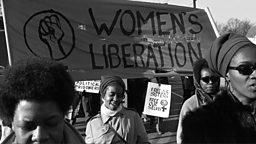The radical history of self-care
Self-care is now a trillion-dollar industry encompassing everything from spa days and scented candles to reiki, yoga and gong baths. But the modern, commercial world of wellness is only one part of the self-care story.
In Analysis: Radical Self-Care, broadcaster and academic Shahidha Bari traces the 20th century political and philosophical roots of self-care, including its often overlooked origins in feminist activism and the struggle for civil rights.

Californian counter-culture of the 1960s
The Esalen Institute in California is sometimes described as the birthplace of the modern wellness movement. Shahidha Bari explains how in the 1960s, this spiritual retreat and think tank attracted writers and intellectuals to discuss new approaches to health, with an emphasis on alternative medicine and yoga.
-
![]()
Analysis: Radical Self-Care
Shahidha Bari looks at the radical history of self-care and what it tells us about how we look after ourselves.
Esalen’s work took off when young people, fired up by the drug-infused, free loving counterculture of the 1960s and 70s, became interested in wellness too.
Jeff Kripal, Professor of Philosophy at Rice University, Texas, says intellectuals and authors had been promoting self-care concepts for decades, with little public interest. But then, “here comes this youth culture and suddenly, they’re not just listening, they’re really excited about these ideas.”
-
![]()
Archive on 4: The Wellness Phenomenon
Claudia Hammond explores the wellness phenomenon.
Silicon Valley and self-development
Many of the young people who learned new philosophies around wellness and human potential at Esalen went on to work in Silicon Valley’s burgeoning tech industry.
André Spicer, Professor of Organisational Behaviour at Cass Business School, London, explains how these ideas soon morphed into the beginnings of the commercial wellness industry.
“One of the big changes has been the movement from the hippy world, where the focus was on self-development for exploration and creativity, to self-development as a way of unlocking your inner potential on the market. You know, to be able to become a more productive, competitive and ultimately marketable person.”

How to find help for your own mental health
Some of the best ways to find help for your own mental health.
From marginal to mainstream
But the Esalen Institute and the rise of individualism are only one part of the wellness story.

Bari explores how many of our modern ideas around self-care come from communities that had to fight collectively to have their rights and needs recognised.
Natalia Mehlman Petrzela, Associate Professor of History at The New School, New York, explains that “a lot of the power of the contemporary wellness moment derives from the fact that people whose bodies and ideas were long marginalised by a mainstream medical, commercial, athletic establishment, that a lot of those people’s ideas are what gave rise to this moment.”
This includes women, who began “reclaiming their own bodily health and own bodily strength” in the 1960s and 70s, and are now “massive consumers and proponents of wellness in its best and worst forms.”
Mehlman Petrzela says, “I think particularly for women, who are so often expected to care for others… the notion of taking time for yourself can be seen as selfish or indulgent. And I think that in that very basic sense, self-care absolutely can be a feminist act.”

The Black Panthers and health activism
Feminism wasn’t the only social movement to focus on self-care. Mehlman Petrzela says that at the same time, “you saw African American groups like the Black Panthers putting bodily wellbeing and health at the centre of their politics.”
-
![]()
Archive on 4: The British Black Panthers
The untold story of the years when Black Power came to Britain and forever left its mark.
Alondra Nelson, Professor of Social Science at the Institute for Advanced Study in Princeton, New Jersey, explains that many medical clinics in the USA either didn’t allow black people or gave them segregated care. So the issue of health was fundamental to the campaign against racial discrimination.
The issue of health was fundamental to the campaign against racial discrimination.Alondra Nelson, Professor of Social Science at the Institute for Advanced Study, Princeton
“The Black Panther Party, for a short time, created a national network of free health clinics. So, by the time we get to about 1969, early 1970, any group that wanted to call itself a Black Panther chapter was required to sell copies of the Black Panther newspaper, but also to have a health clinic.”
As well as access to healthcare, the party was committed to a broader idea of wellbeing. Bari explains that the Black Panthers’ health activism “naturally extended beyond traditional medicine too, because it entailed a wholesale reimagining of what being well could mean for African Americans.”
Covid-19 and Black Lives Matter
Today, Bari says, both the Black Lives Matter movement, which has mobilised in the wake of the death of George Floyd in police custody, and the Covid-19 virus, which has disproportionately affected black, Asian and minority ethnic people, have highlighted systemic inequalities around who gets cared for in society.

Nelson thinks the 1970s suggest the two are deeply interrelated. She says: “I’ve been thinking so much, given contemporary politics around health disparities and Covid, you know, about issues of housing and access to food, and how and where people live has everything to do with how healthy they can be.”
As a result, self-care becomes even more important for people who are marginalised. Nelson says that “if you are a member of a community like mine, that’s understood not to matter, you know, self-care is an urgent necessity.”
Self-care as a political act
Nelson explains that for people who have been marginalised, “self-care is the norm. You know, it’s not a kind of luxury or a fad that one can pick up and put down. Self-care has been how people have survived, how they’ve continued to be resilient over time and over generations.”
So, while it’s easy to think of self-care as inward-looking or indulgent, it can actually be communal and essential. More than that, Bari says, “it can be a form of resistance… it can, in fact, be an expression of a collective political will, a strategy, even, for activism.”
The American writer and activist Audre Lorde once said: “Caring for myself is not self-indulgent. It is self-preservation, and that is an act of political warfare.”
To hear more listen to Analysis: Radical Self-Care

Why the self-care movement really works
What is self-care and what's the evidence that it works for anxiety and depression?
More from Radio 4
-
![]()
Analysis: Radical Self-Care
Shahidha Bari looks at the radical history of self-care and what it tells us about how we look after ourselves.
-
![]()
How wellness became big business
Where did the wellness phenomenon come from and what really works?
-
![]()
Seven tips for staying happy and healthy during a lockdown
Dr Beth Healey specialises in advising on staying happy and healthy in isolation.
-
![]()
Nine tips for achieving wellbeing on a budget
Feeling better in body and mind doesn’t have to involve an extortionate pricetag.






